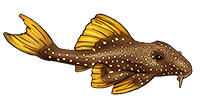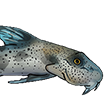First of all I'm not trying to attack anyone, I just need some clarification
There is no doubt that the Germans know their stuff when it comes to fish, and plecos especially. But there are somethings that confuse me when it comes to their prepared fish foods. Mainly there are two concerns to me
Firstly: Vague ingredient lists. In many foods the actual ingredients aren't listed and you just see generic terms like "derivatives of vegetable origin", "cereals". It doesn't tell you exactly what's in there, it seems pointless. Why can't they just list what's in there so I could make a better decision on what to buy? And in the case of JBL novo pleco food I wasn't even able to find an actual ingredient list, they just have the percentages listed of the ingredient "groups". Why would they do that? I'm genuinly confused.
Secondly: The overuse of starches and carbs. Many foods have the first few ingredients as starches and grains, stuff like wheat flour, wheat germ, corn flour, etc. Shouldn't we be going away from grains in fish foods? To my point of view grains are a "necessary evil" and to be used as a binder in minimal amounts, with the rest of the ingredients being high quality. Take Sera's catfish chips for an example; the first ingredient is fish meal which is passable, but the 3 next ingredients are fillers. Is that even good for the fish in the long term and can the fish even digest this?
In contrast, foods like new life spectrum and northfin have starches way below other inredients. So is there a benefit to the added grains or are they a way to reduce the cost.
Again I'm not bashing on any manufacturer here I'm just concerned for the health of my fish. Also please excuse my English.
Thanks
German Fish Foods
-
Bas Pels
- Posts: 2913
- Joined: 21 Dec 2006, 20:35
- My images: 1
- My cats species list: 28 (i:0, k:0)
- Spotted: 8
- Location 1: the Netherlands
- Location 2: Nijmegen the Netherlands
- Interests: Central American and Uruguayan fishes
Re: German Fish Foods
With regard to your point in carbohydrates in fishfood, please do remember, the vegitarian plecos mostly eat algae.
Now I'm not aware of the precise content of algae, but I would assume they are a lot like most other plants, that is they will contain carbohyudrates, as starch, as an energy source.
Feeding a micro-predator, such as a neon tetra, starch is not a good idea, but feeding starch to a pleco? If the pleco is a vegetarian, I would not see the problem.
I do think, however, that it is incorrect to produce a fish food for "all ornamental fish".
And if the pleco is a Hypancistrus, these are predators, feeding starch woud, certainly, not be a good idea.
Now I'm not aware of the precise content of algae, but I would assume they are a lot like most other plants, that is they will contain carbohyudrates, as starch, as an energy source.
Feeding a micro-predator, such as a neon tetra, starch is not a good idea, but feeding starch to a pleco? If the pleco is a vegetarian, I would not see the problem.
I do think, however, that it is incorrect to produce a fish food for "all ornamental fish".
And if the pleco is a Hypancistrus, these are predators, feeding starch woud, certainly, not be a good idea.
cats have whiskers
-
Redrain
- Posts: 55
- Joined: 02 Apr 2017, 14:55
- My cats species list: 14 (i:2, k:4)
- My BLogs: 1 (i:0, p:41)
- My Wishlist: 57
- Spotted: 16
- Location 1: Kuwait
- Location 2: Kuwait
- Interests: SA/CA Cichlids, Gaming
Re: German Fish Foods
Thanks for the reply, I see your point but from what I've found different kinds of algae can have drastically different compositions. I'm not sure I'd put algae in the same group with grains, I think it's safer to compare them to leafy green vegetables (I'm no nutritionist btw). Some studies show that grains and wheat in specific might not be the best choice even for humans to consume all the time. So why would we give it to the fish? It's kind of weird to me, I know that we feed stuff that fish don't see in the wild but grains to me don't make sense.Bas Pels wrote: ↑21 Nov 2021, 14:10 With regard to your point in carbohydrates in fishfood, please do remember, the vegitarian plecos mostly eat algae.
Now I'm not aware of the precise content of algae, but I would assume they are a lot like most other plants, that is they will contain carbohyudrates, as starch, as an energy source.
Feeding a micro-predator, such as a neon tetra, starch is not a good idea, but feeding starch to a pleco? If the pleco is a vegetarian, I would not see the problem.
I do think, however, that it is incorrect to produce a fish food for "all ornamental fish".
And if the pleco is a Hypancistrus, these are predators, feeding starch woud, certainly, not be a good idea.
And the other issue is that most food manufacturers make a "one size fits all" food when it comes to plecos. So the variety is lacking at least where I live.
-
Amelia Belli
- Posts: 6
- Joined: 13 Sep 2021, 11:32
- Location 1: United States
- Location 2: Florida
- Interests: Bass Fishing, Catfish, and Carp Fishing
Re: German Fish Foods
Of salt water fish, Alaska pollock is the most common. Popular freshwater fish on the German menu are trout, pike, carp, and European perch also are listed frequently.




